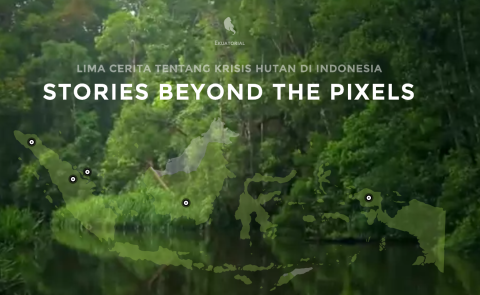
The Ekuatorial team displays environmental degradation in Indonesia through longform journalism and mapping, user experience gets a hackathon in Buenos Aires and more from the Knight Fellows in this week’s roundup.
Mapping deforestation in Indonesia
Ekuatorial, an environmental news site and mapping platform, created a visual experience with its investigation into the impacts of deforestation in Indonesia. The report includes details on the politics behind protecting Indonesia’s rainforests and how carbon emissions are causing fires and destroying animals’ habitats. Checking out the digital presentation is worth it, even if you can’t read Bahasa Indonesia.
Former ICFJ Knight Fellow Gustavo Faleiros helped spearhead the creation of Ekuatorial using JEO, an open source WordPress geojournalism platform he built during his fellowship.
Hacking user experience
ICFJ Knight Fellow Mariano Blejman and Hacks/Hackers Buenos Aires held a UXathon last weekend for hackers interested in user experience. The event was on Saturday at 10 a.m., and mentors included 2013 JSK Stanford Fellow Nuno Vargas, UX consultant Eduardo Mercovich and representatives from Aerolab, a digital agency based in Buenos Aires.
To follow along with their projects, view the UXathon on HackDash.
A word on the open data movement and civic tech in Africa
Upcoming ICFJ Knight Fellow Raymond Joseph published a piece on The Media Online about how the open data movement continues to expand across Africa. Joseph attributes some of the success to changing governmental policies in certain countries and journalism trainings from nonprofit civic coding organizations like ICFJ Knight Fellow Justin Arenstein’s Code for Africa (CfA) and Code for South Africa (CfSA).
In collaboration with Open Knowledge, CfA also announced its 2015 Open Government fellows after receiving applications from 450 people from 34 countries. The four fellows chosen are: Suhuyini Salim Shani of Ghana, who is the lead implementer for a VOTO Mobile project popularly called “All Voices Matter”; Irene Ikomu, a lawyer based in Uganda who runs Parliament Watch Uganda; technologist Claude Migisha of Rwanda; and Seember Nyager of the Public and Private Development Centre in Nigeria. To read their bios, click here.
In other CfSA news, the organization’s principal technologist Greg Kempe recently talked about Wazimap, which uses election and Census data to examine communities. View the video below.
Happy Mother’s Day from Code for Ghana
Code for Ghana released an infographic illustrating that Ghana is ranked 154 out of 179 countries in the Motherest Index Ratings, according to a report by Save the Children. The Gross National Income per capita of women in the country is US$1,770, and the under-five mortality rate per 1,000 live births is 78.4.
Happy mothers day!!! cc @ICFJ @ICFJKnight @CodeForAfrica @code4sa pic.twitter.com/mYgl6DZRnd
— Code for Ghana (@CodeforGhana) May 10, 2015
Winners from Karachi’s d|bootcamp
Last week, ICFJ Knight Fellow Rahma Mian held Karachi’s first data bootcamp in conjunction with the Center for Excellence in Journalism and the International Center for Journalists.
After two days of learning about data tools and methods to disseminating data, 10 teams presented their project ideas, and five were declared winners. Projects ranged from tracking honor killings to mapping crimes. Click here to see the list of winners and read a rundown of the data bootcamp.
Beginning of Data Journalism in #Pakistan #dbootcamp @CEJatIBA #datascience http://t.co/OxOLQpJGGv
— Jawad Khan (@jawadkhan1) May 9, 2015
As promised, compiled list of tools covered at #dBootcamp Karachi in the last two days: http://t.co/lE579qbV1T
— Serah Njambi Rono (@CallMeAlien) May 8, 2015
This post is also published on IJNet, which is produced by ICFJ.
Credit: screen grab from Ekuatorial website.